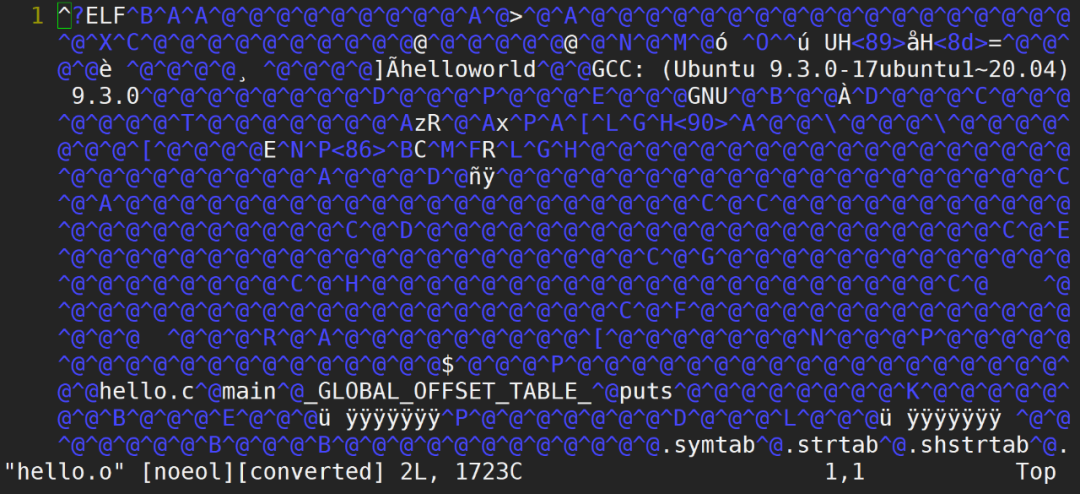

盘点一下gcc有哪些常用选项
描述
gcc有哪些常用选项,今天,就来给大家盘点一下。
-E表示预处理,处理所有以井号键开头的代码,常见的比如把头文件展开。
hello.c
#include预处理:int main() { printf("helloworld "); return 0; }
gcc -E hello.c -o hello.i预处理后的文件:
# 1 "hello.c" # 1 "-S表示编译,把C文件变成汇编文件。" # 1 " " # 31 " " # 1 "/usr/include/stdc-predef.h" 1 3 4 # 32 " " 2 # 1 "hello.c" # 1 "/usr/include/stdio.h" 1 3 4 # 27 "/usr/include/stdio.h" 3 4 # 1 "/usr/include/x86_64-linux-gnu/bits/libc-header-start.h" 1 3 4 # 33 "/usr/include/x86_64-linux-gnu/bits/libc-header-start.h" 3 4 # 1 "/usr/include/features.h" 1 3 4 # 461 "/usr/include/features.h" 3 4 # 1 "/usr/include/x86_64-linux-gnu/sys/cdefs.h" 1 3 4 # 452 "/usr/include/x86_64-linux-gnu/sys/cdefs.h" 3 4 # 1 "/usr/include/x86_64-linux-gnu/bits/wordsize.h" 1 3 4 # 453 "/usr/include/x86_64-linux-gnu/sys/cdefs.h" 2 3 4 # 1 "/usr/include/x86_64-linux-gnu/bits/long-double.h" 1 3 4 # 454 "/usr/include/x86_64-linux-gnu/sys/cdefs.h" 2 3 4 # 462 "/usr/include/features.h" 2 3 4 # 485 "/usr/include/features.h" 3 4 # 1 "/usr/include/x86_64-linux-gnu/gnu/stubs.h" 1 3 4 # 10 "/usr/include/x86_64-linux-gnu/gnu/stubs.h" 3 4 # 1 "/usr/include/x86_64-linux-gnu/gnu/stubs-64.h" 1 3 4 # 11 "/usr/include/x86_64-linux-gnu/gnu/stubs.h" 2 3 4 # 486 "/usr/include/features.h" 2 3 4 # 34 "/usr/include/x86_64-linux-gnu/bits/libc-header-start.h" 2 3 4 # 28 "/usr/include/stdio.h" 2 3 4 # 1 "hello.c" # 1 " " # 1 " " # 31 " " # 1 "/usr/include/stdc-predef.h" 1 3 4 # 32 " " 2 # 1 "hello.c" # 1 "/usr/include/stdio.h" 1 3 4 # 27 "/usr/include/stdio.h" 3 4 # 1 "/usr/include/x86_64-linux-gnu/bits/libc-header-start.h" 1 3 4 # 33 "/usr/include/x86_64-linux-gnu/bits/libc-header-start.h" 3 4 # 1 "/usr/include/features.h" 1 3 4 # 461 "/usr/include/features.h" 3 4 # 1 "/usr/include/x86_64-linux-gnu/sys/cdefs.h" 1 3 4 # 452 "/usr/include/x86_64-linux-gnu/sys/cdefs.h" 3 4 # 1 "/usr/include/x86_64-linux-gnu/bits/wordsize.h" 1 3 4 # 453 "/usr/include/x86_64-linux-gnu/sys/cdefs.h" 2 3 4 .....
还是使用hello.c源文件。
gcc -S hello.c -o hello.s汇编后的文件变成:
.file "hello.c"
.text
.section .rodata
.LC0:
.string "helloworld"
.text
.globl main
.type main, @function
main:
.LFB0:
.cfi_startproc
endbr64
pushq %rbp
.cfi_def_cfa_offset 16
.cfi_offset 6, -16
movq %rsp, %rbp
.cfi_def_cfa_register 6
......
-c表示汇编,把汇编文件变成二进制文件,但是这个二进制文件还不能运行,因为缺少库的信息。还是使用hello.c源文件:
gcc -c hello.c -o hello.o汇编后的文件是二进制文件,用vim打开后是这样:

-l表示链接库的名字,比如我们经常用的多线程,编译的时候加上加上-lpthread 编译器会自动去找 libpthread.so,如果代码里面用到第三方库,一般都要加上。
thread.c
#include编译:#include #include void *my_thread(void *arg) { printf("this is my thread ... "); } int main() { pthread_t tid; if (pthread_create(&tid, NULL, my_thread, NULL) != 0) { perror("pthread_create"); exit(1); } void *status; pthread_join(tid, &status); return 0; }
gcc thread.c -o thread -lpthread-L表示库的路径。如果是你自己制作的库文件,并且没有放在系统指定的目录下,比如 /lib,那编译的时候就要加上库的路径,否则,编译器找不到库在哪。
假设有个动态库叫做 libtest.so,存放在当前目录下:
root@Turbo:test# ls hello.c libtest.so
如果编译的时候需要链接 libtest.so,则:
gcc main.c -o main -ltest -L .-I表示头文件路径,常用于自己写的头文件,不在当前目录下,那编译的时候就得指定头文件的路径。
假设 hello.c 源文件包含了 hello.h 头文件:
#include "hello.h"hello.h存放在上一级目录:
root@Turbo:test# ls hello.c root@Turbo:test# ls .. hello.h test编译的时候,需要指定头文件的路径:
gcc hello.c -o hello -I ..-g表示可以调试,比如我们之前讲的gdb、valgrind,如果想要调试的时候显示源码、行号,编译的时候就需要加上-g选项。
gcc hello.c -o hello -g-O表示优化,可以是O0到O3,我们之前讲volatile的时候,就用过这个选项,不同的优化等级,对代码的处理略微有些区别。
hello.c
#include不优化:#include void delay() { int i, j; for (i = 0; i < 100000; i++) { for (j = 0; j < 10000; j++); } } int main() { printf("%ld ", time(NULL)); delay(); printf("%ld ", time(NULL)); return 0; }
gcc hello.c -o hello运行结果:
root@Turbo:test# ./hello 1683603927 1683603929 root@Turbo:test#优化:
gcc hello.c -o hello -O3运行结果:
root@Turbo:test# ./hello 1683603941 1683603941 root@Turbo:test#当然,还有 -o,表示输出的意思,用来指定编译后生成文件的名字。
gcc hello.c -o hello-Wall表示打开所有警告,有时候编译器会认为一些不规范的写法影响不大,并不会提示出来,加上Wall,会把这些不重要的警告也打印出来。
hello.c
#include不打开警告编译:int main() { int i; return 0; }
root@Turbo:test# gcc hello.c -o hello root@Turbo:test#打开警告编译:
root@Turbo:test# gcc hello.c -o hello -Wall
hello.c: In function ‘main’:
hello.c:5:6: warning: unused variable ‘i’ [-Wunused-variable]
5 | int i;
| ^
root@Turbo:test#
-D表示添加宏定义,调试代码的时候非常有用,可以避免每次都要修改代码。hello.c
#include编译不提供宏定义:int main() { #ifdef HELLO printf("helloworld "); #endif return 0; }
gcc hello.c -o hello运行结果:
root@Turbo:test# ./hello root@Turbo:test#编译提供宏定义:
root@Turbo:test# gcc hello.c -o hello -DHELLO root@Turbo:test#运行结果:
root@Turbo:test# ./hello helloworld
审核编辑:刘清
声明:本文内容及配图由入驻作者撰写或者入驻合作网站授权转载。文章观点仅代表作者本人,不代表电子发烧友网立场。文章及其配图仅供工程师学习之用,如有内容侵权或者其他违规问题,请联系本站处理。
举报投诉
-
Linux 下GCC的编译2023-09-11 3466
-
常用编辑器之GCC编译器2024-08-24 7379
-
不常见但是很有用的 gcc 命令行选项2016-12-31 3555
-
gcc和Linux gcc 的常用选项2020-10-19 1272
-
常见gcc编译警告整理以及解决方法2017-11-14 21987
-
嵌入式Linux工具之GCC常用编译选项2018-03-22 8136
-
盘点一下哪些手机支持5G网络呢2019-08-22 17784
-
Linux和UNIX的GCC命令大全2019-11-01 924
-
Linux系统下Gcc的基本用法和选项2020-08-20 1486
-
gcc的使用方法以及Linux gcc 的常用选项2020-10-22 3716
-
gcc的编译选项总结2022-11-02 2638
-
tcpdump常用的选项参数详细总结2023-09-28 3560
-
认识一下几个常用的门级电路2023-10-09 3051
-
盘点一下CST电磁仿真软件的求解器2023-11-20 8327
-
盘点一下高通CES 2024汽车创新技术2024-01-13 2428
全部0条评论

快来发表一下你的评论吧 !

